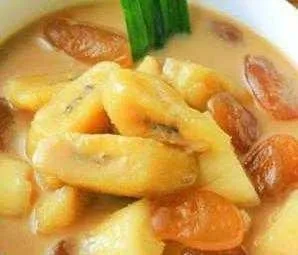
Although literally means "hastening" in breaking the fast, takjil in Indonesia is more synonymous with the food used to break the fast. More specifically, the sweet food served as an opening before starting the main meal. Cholesterol, fruit soup, and green bean porridge are the types of takjil that you are familiar with.
Well, what are the menu takjil you can eat, which is not only delicious but also has many health benefits?
Compote
This sweet handmade become a dish takjil when breaking the fast. The contents can be various kinds ranging from sweet potatoes, bananas, salak seeds, cassava, pumpkin, and others. These ingredients are then cooked together with brown sugar and coconut milk.
As the main ingredients in the compote, the commonly used tubers have health benefits. Sweet potatoes, for example, are good sources of vitamin A. One medium sized sweet potato contains approximately 400 percent of your daily vitamin A requirement. Vitamin A in this yam is available in beta-carotene form, a basic compound that will be converted into vitamin A by the body.
This makes the sweet potato has a function to maintain eye health. For those suffering from diabetes, sweet potato is one of the best sources of carbohydrate because it has a low glycemic index value and in some studies mentioned that the consumption of sweet potato can reduce the worsening of insulin resistance in diabetics. Cassava can also be an alternative source of potassium, a medium-sized sweet potato contains 542 mg of potassium.
In addition, cassava which is also one of the ingredients to make kolak has a positive effect for health. As a source of minerals and vitamins, cassava can help you meet your magnesium, vitamin C, and folate needs. One cup of cassava can provide 14 percent of the requirement of folate, and 50 percent of your vitamin C needs.
Not only tubers only, other materials such as brown sugar and coconut milk was also instrumental in helping maintain your health. Although often associated with high cholesterol disease, coconut milk actually does not contain cholesterol because it comes from plants. But it is in coconut milk contained high saturated fat.
Each 100 ml of coconut milk contains approximately 13.2 grams of saturated fat. But in coconut (especially the coconut meat) there is a component called lauric acid. In the body lauric acid will be converted into monolaurin form, an antiviral and antibacterial compounds that serve to protect the body from infections and diseases caused by viruses.
Red sugar used in the manufacture of kolak is a type of natural sweetener low value glycemic index, so it can be used as an alternative sweetener for those who suffer from diabetes. But you are expected to keep consuming coconut milk and brown sugar to taste just because if excessive it will actually cause disease.